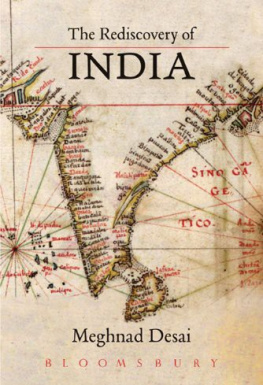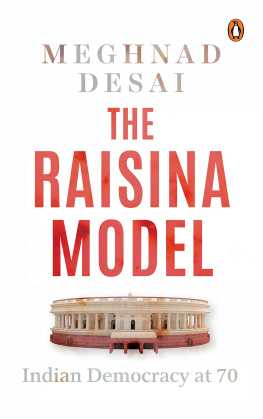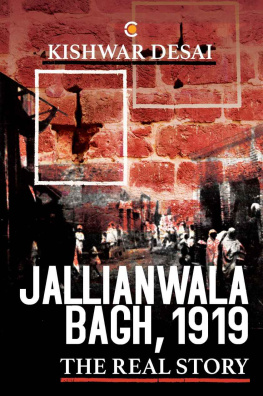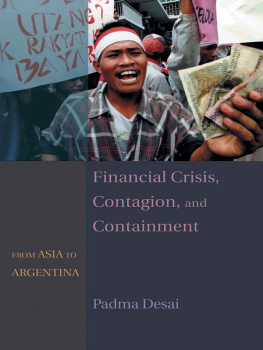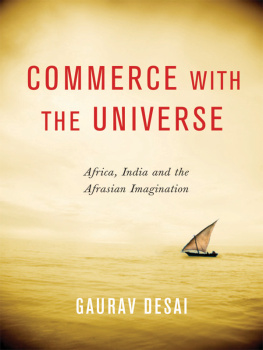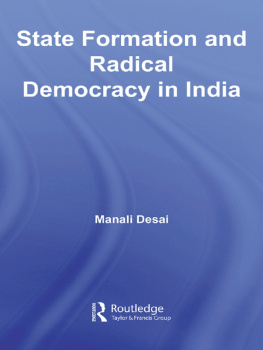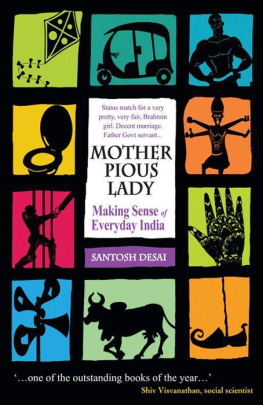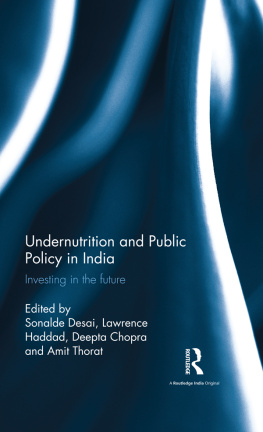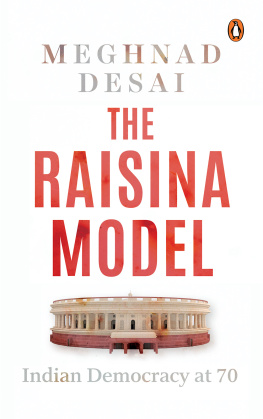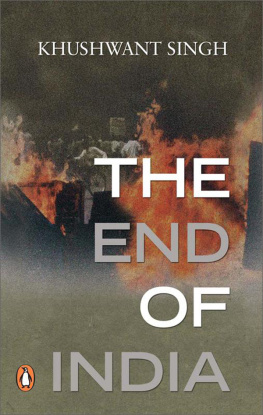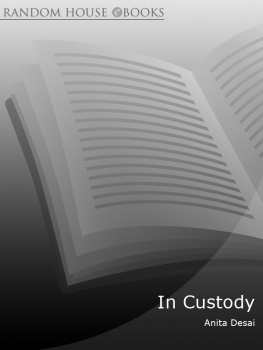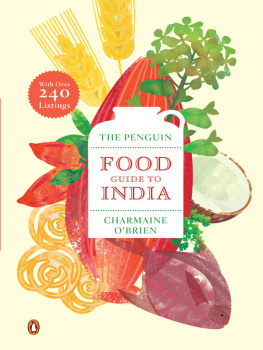Desai - Penguin India Rediscovry Of India
Here you can read online Desai - Penguin India Rediscovry Of India full text of the book (entire story) in english for free. Download pdf and epub, get meaning, cover and reviews about this ebook. year: 2011, publisher: GAPPAA ORG;Penguin, genre: Politics. Description of the work, (preface) as well as reviews are available. Best literature library LitArk.com created for fans of good reading and offers a wide selection of genres:
Romance novel
Science fiction
Adventure
Detective
Science
History
Home and family
Prose
Art
Politics
Computer
Non-fiction
Religion
Business
Children
Humor
Choose a favorite category and find really read worthwhile books. Enjoy immersion in the world of imagination, feel the emotions of the characters or learn something new for yourself, make an fascinating discovery.
Penguin India Rediscovry Of India: summary, description and annotation
We offer to read an annotation, description, summary or preface (depends on what the author of the book "Penguin India Rediscovry Of India" wrote himself). If you haven't found the necessary information about the book — write in the comments, we will try to find it.
Desai: author's other books
Who wrote Penguin India Rediscovry Of India? Find out the surname, the name of the author of the book and a list of all author's works by series.
Penguin India Rediscovry Of India — read online for free the complete book (whole text) full work
Below is the text of the book, divided by pages. System saving the place of the last page read, allows you to conveniently read the book "Penguin India Rediscovry Of India" online for free, without having to search again every time where you left off. Put a bookmark, and you can go to the page where you finished reading at any time.
Font size:
Interval:
Bookmark:


PENGUIN BOOKS
PENGUIN BOOKS
Meghnad Desai was born in Vadodara, Gujarat, and received his BA and MA degrees from the University of Bombay. He went to the US in 1961 where he completed a doctorate at the University of Pennsylvania. He taught economics from 1965 to 2003 at the London School of Economics, where he now holds the post of Professor Emeritus. He has authored over twenty books and two hundred articles. His recent books include Marxs Revenge: Resurgence of Capitalism and the Death of Statist Socialism; Nehrus Hero: Dilip Kumar in the Life of India; Development and Nationhood: Essays on the Political Economy of South Asia; Rethinking Islamism: Ideology of the New Terror; and a novel, Dead on Time.
An active member of the British Labour Party since 1971, he was made Lord Desai of St Clement Danes in 1991, and was awarded the Bharatiya Pravasi Puraskar in 2004 and the Padma Bhushan in 2008. He divides his time between London, Delhi and Goa.
[This] is a brilliant engagement with a familiar theme, but creatively and provocatively revisionist in mood and intent
The Hindu
An opinionated but always interesting history [Desai] has an instinctive understanding of the imperatives of postcolonial consolidation that greatly constricted decision-making in the early years of the Indian republic
Financial Times
Meghnad Desais learned, elegant and provocative book is sure to rekindle the debate about the idea of India, its political and cultural roots and meanings. The reader will enjoy joining the author on his journey of rediscovery, as he deftly situates the unfolding of Indias modern history in its global context
Sugata Bose, Gardiner Professor of History and Director, South Asia Initiative, Harvard University
To Kishwar
for her constant support and love
MOST OF THIS book was written between July 2007 and December 2008. Yet, the ideas in it began to germinate in my mind fifty and more years previously. I was seven when India became independent and for the first ten years after that I, along with most others, accepted a well-known view of the nature of India as a nation. I read Nehrus The Discovery of India when in my teens. It gave us the basic story, beautifully recounted by a masterful writer.
The story was a simple and seamless one. India had struggled hard against British imperialism but thanks to the leadership of Gandhi, along with his heir and trusted lieutenant Nehru, India had thrown off the foreign yoke. The British had always practised divide and rule and the sad result was the Partition, thanks to Jinnahs fanatic insistence on the Two Nation theory, utterly rejected by the Congress party. Post-Partition, and now independent, India was united and hopeful. Its unity was based on a syncretic culture of Hindus and Muslims. The Partition of India had served as a warning to the leaders against any further divisions; the spectre of Balkanization haunted India.
This seamless story was shattered during the 1950s itself. The agitation for linguistic states took a popular anti-Congress form in Bombay where I was growing up, and we could see that despite Nehrus reluctance to grant the demands, linguistic states were popular. What followed in 1959 was much more serious. The publication of Maulana Azads India Wins Freedom shattered the accepted story of Indias independence. We learnt that there had been differences and disagreements among Congress leaders as well, and not just between them and Jinnah. Azads assertion that Nehru might have single-handedly thrown the chance of a united India under the Cabinet Mission plan was shocking and controversial. Newspapers and journals were full of arguments for and against him. India had suddenly become aware that its own history was not a single unit but had rival strands. This is true of most countries; we had just witnessed India growing up.
Bombay state was divided into Gujarat and Maharashtra in 1960, and Bombay city began its new career as the capital of a Marathi-speaking state rather than the commercial capital of cosmopolitan India. I left India for studies abroad, but even as I pursued my career in economics, I kept up my reading and thinking about India and how it became a nation, about the subdivisions within, as much as the big division which caused the Partition.
During the next forty-odd years, I wrote a number of essays, some short and others quite long, on the broad question of the nature of Indian nationhood. These are collected in Development and Nationhood, Oxford University Press, New Delhi, 2005. But I did feel that some day I should sit down and write out what I consider the nature of India as a nation and how it came to be what it is. I have been lucky in having colleagues and friends who have been very indulgent of my forays into their special fields. (Their names are in the preface to Development and Nationhood.) I have also been fortunate in having access to some of the best libraries at the universities of Bombay, Pennsylvania, California (Berkeley) and the London School of Economics plus, last but not the least, the House of Lords.
Neither friends nor an ample supply of books can be a guarantee against error, and it is with some trepidation that I now put this book forward. It is an ambitious book but it is written by someone who cannot claim to be a professional historian. It is my own, somewhat opinionated, account of how India became a nation and a nation state. I begin with the arrival of Vasco da Gama in 1498 and carry the story down to the present day. I take the creation of the Indian nation to be as much a result of global forces as local ones. I emphasize, more than has been done previously, the 250 years of peaceful relations of trade between Europe and India between 1500 and 1750. The story since 1750 has been much covered, but I do see a continuousand not totally negativecontribution of the British Parliament and politics to the development of Indias constitutional position. It is this, as much as the mass mobilization by the Congress, which has shaped India as it is today. Hence the continuity rather than rupture with the British raj. The Congress also cannot be given the sole credit for the outcome of Independence. The more I read about the period between 1847 and 1905, the more impressed I was about how much a certain hegemonic view of the independence struggle has been put forward since Independence.
Indias story, as it fought for Independence, was more than just Gandhi 1921, Gandhi 1930 and Gandhi 1942. There were other parties and leaders, especially the Muslim League and Jinnah, but also the movement of the Dalits and lower castes led by Ambedkar and Naicker, which had their own view of what India should be like after Independence. There were also the Native Princes and the many others who collaborated in the constitutional path charted by the British. There were patriots who rejected the non-violent strategy of the Congress, and dissidents both on the Right and the Left who also fought for the common cause. These aspects have to be given their due weight in the story. The larger perspective, in which the Congress and the British (in India and back home) interacted with non-Congress forces to shape the final outcome, is covered in some detail here. It is important, in my view, to ask whether the Partition was the only possible outcome and, if not, what the alternatives were, and how the one that finally gelled did so.
Font size:
Interval:
Bookmark:
Similar books «Penguin India Rediscovry Of India»
Look at similar books to Penguin India Rediscovry Of India. We have selected literature similar in name and meaning in the hope of providing readers with more options to find new, interesting, not yet read works.
Discussion, reviews of the book Penguin India Rediscovry Of India and just readers' own opinions. Leave your comments, write what you think about the work, its meaning or the main characters. Specify what exactly you liked and what you didn't like, and why you think so.

